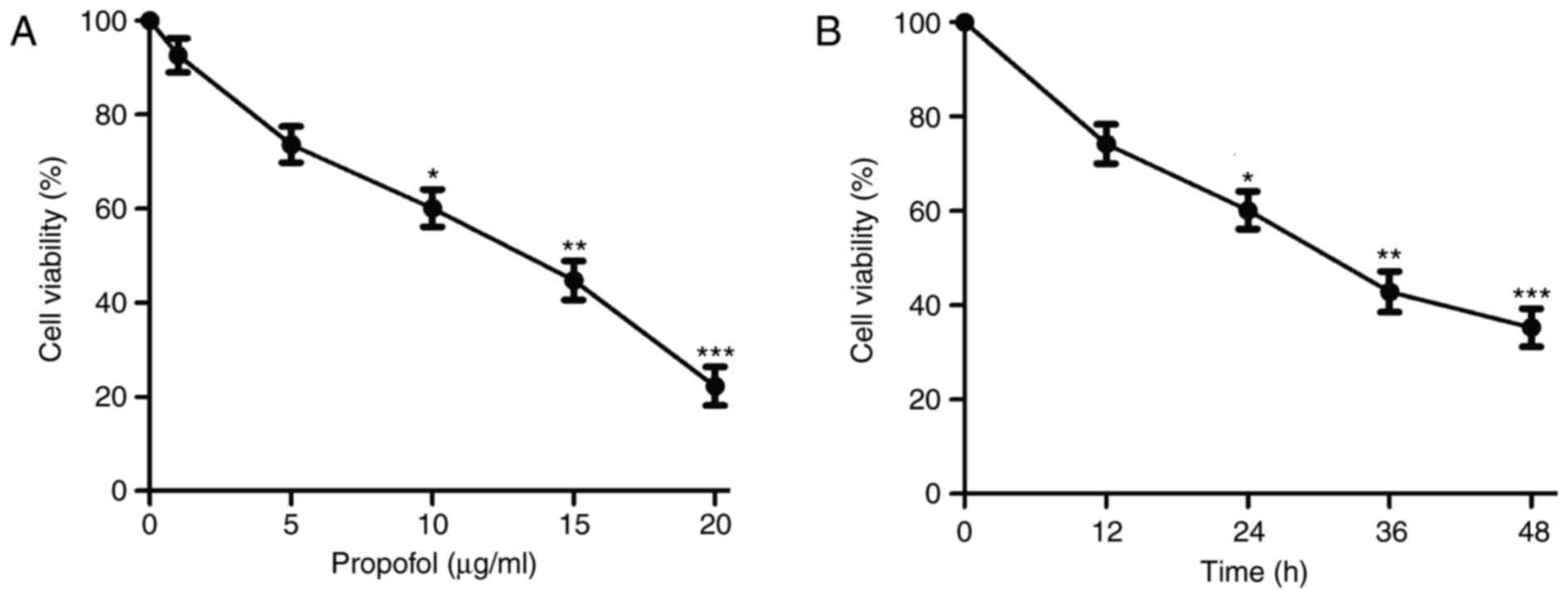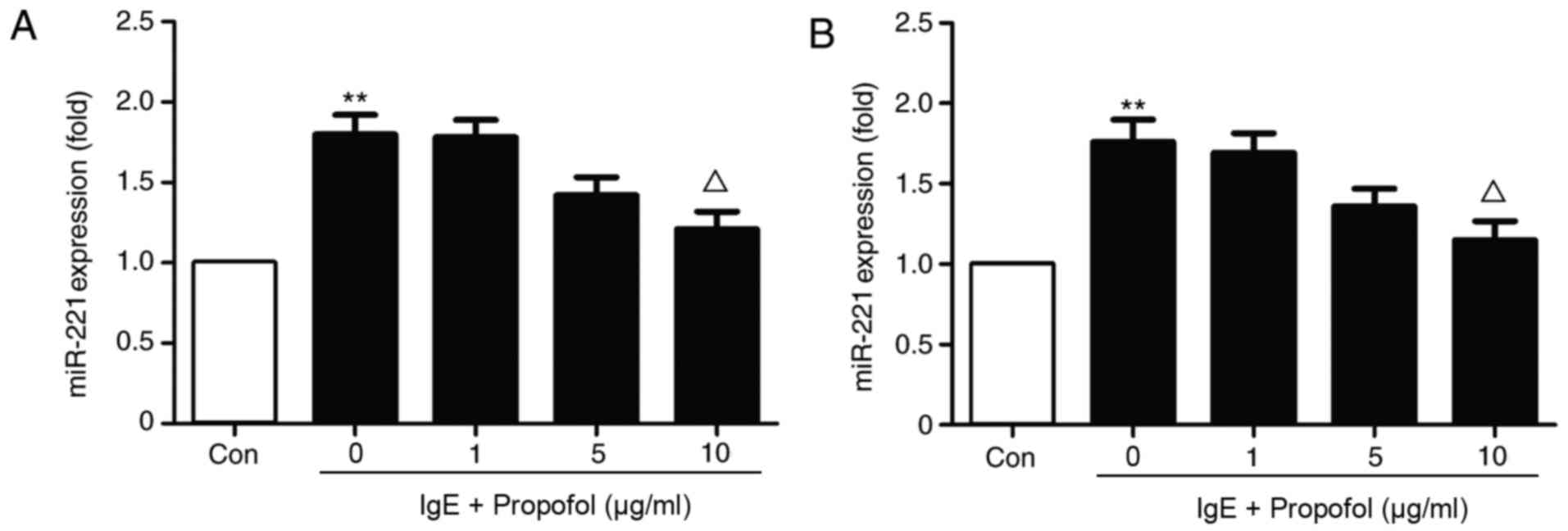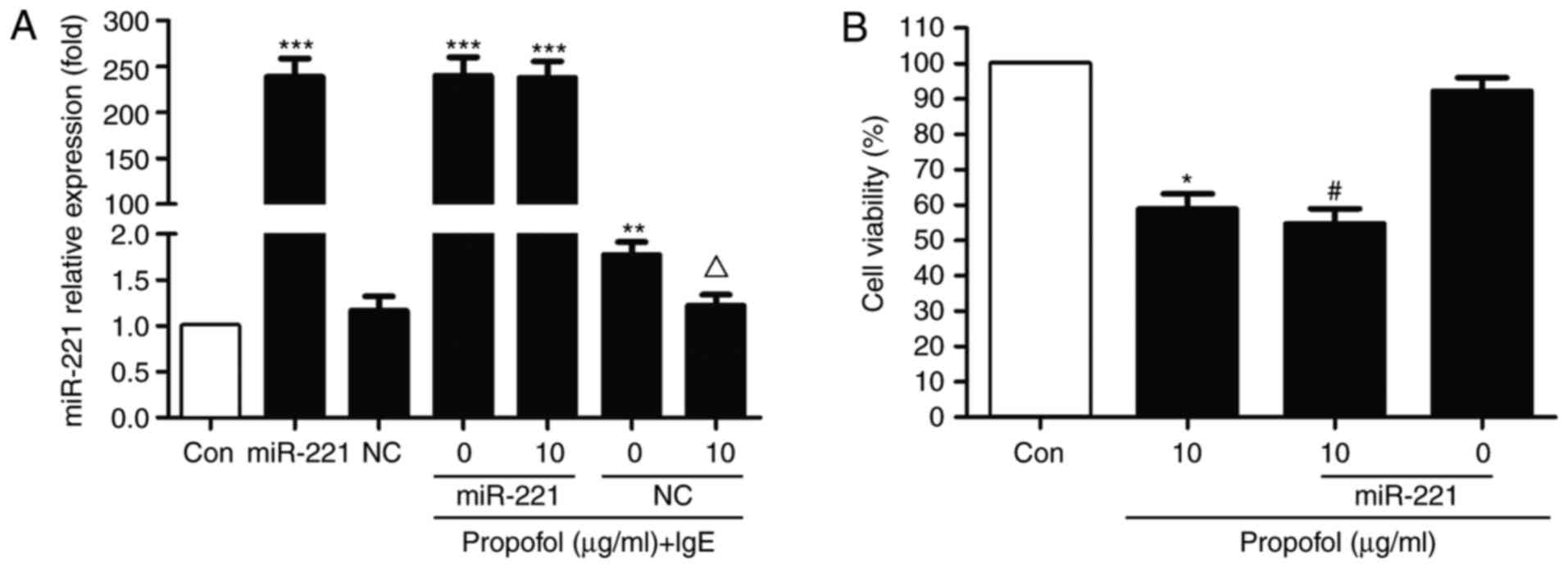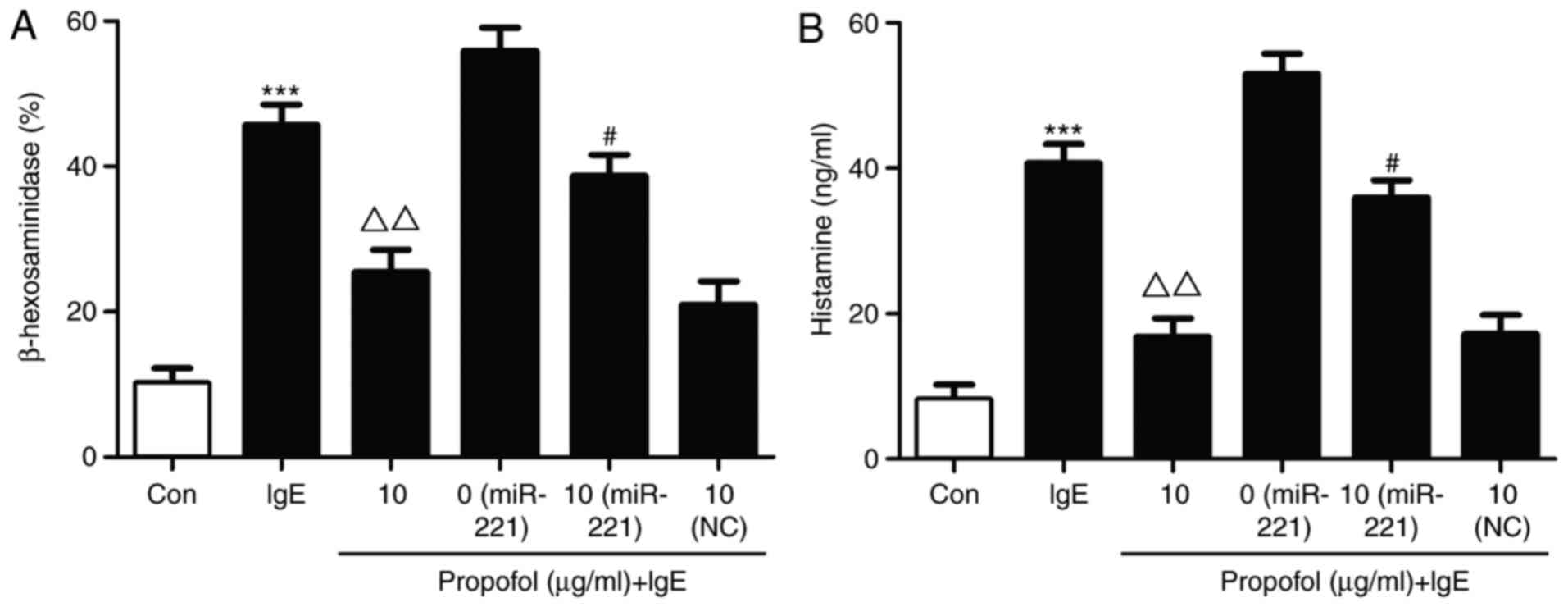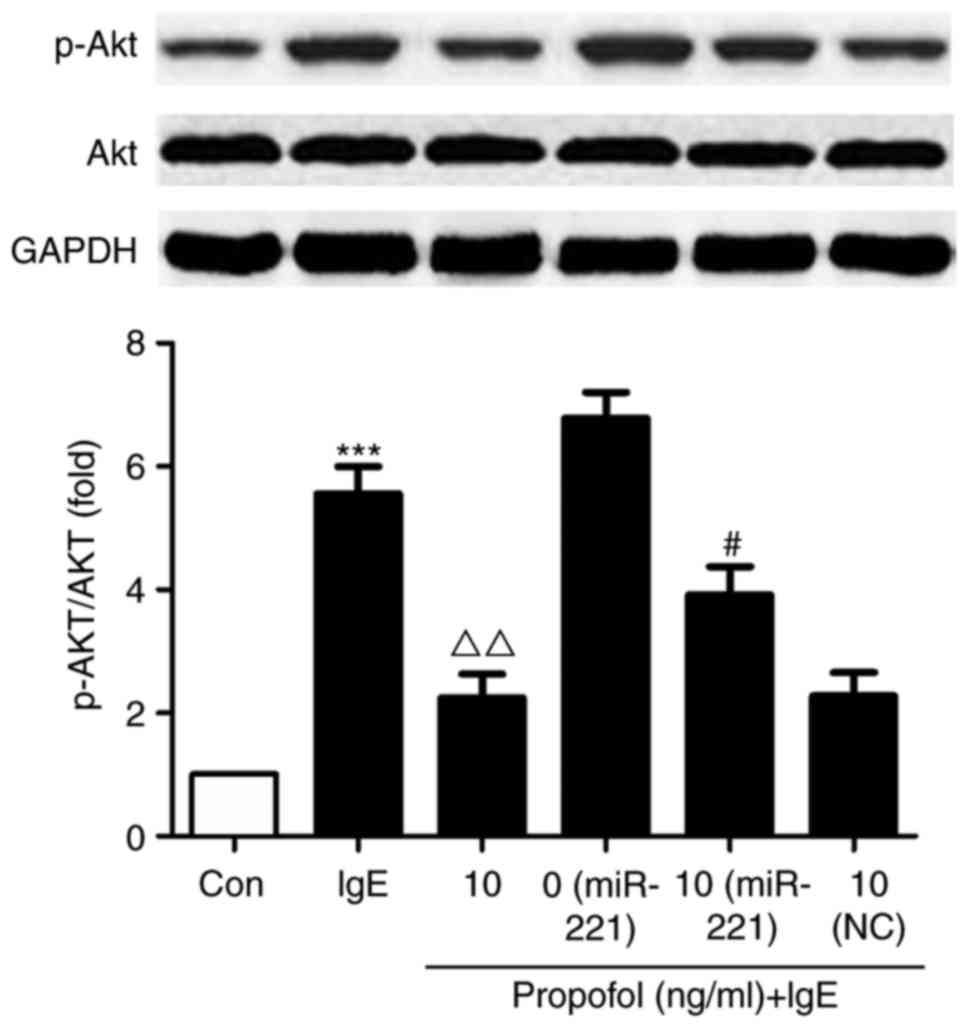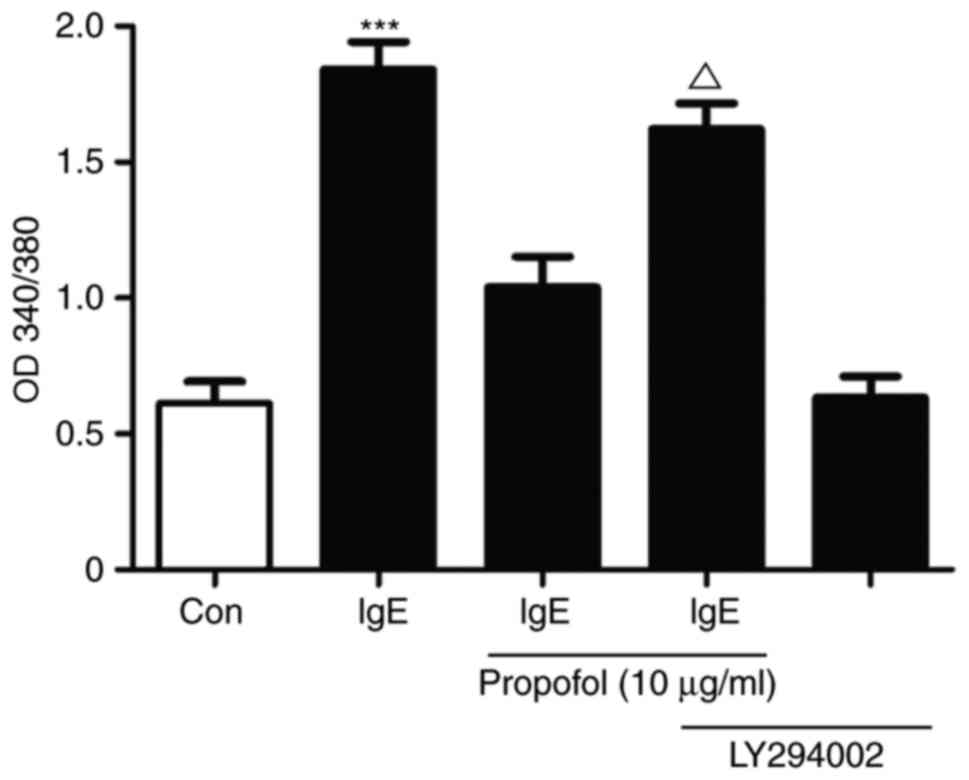|
1
|
Humbles AA, Lu B, Friend DS, Okinaga S,
Lora J, Al-Garawi A, Martin TR, Gerard NP and Gerard C: The murine
CCR3 receptor regulates both the role of eosinophils and mast cells
in allergen-induced airway inflammation and hyperresponsiveness.
Proc Natl Acad Sci USA. 99:1479–1484. 2002. View Article : Google Scholar : PubMed/NCBI
|
|
2
|
Cardamone C, Parente R, Feo GD and
Triggiani M: Mast cells as effector cells of innate immunity and
regulators of adaptive immunity. Immunol Lett. 178:10–14. 2016.
View Article : Google Scholar : PubMed/NCBI
|
|
3
|
Galli SJ and Tsai M: IgE and mast cells in
allergic disease. Nat Med. 18:693–704. 2012. View Article : Google Scholar : PubMed/NCBI
|
|
4
|
Amin K: The role of mast cells in allergic
inflammation. Respir Med. 106:9–14. 2012. View Article : Google Scholar : PubMed/NCBI
|
|
5
|
Gelfand EW, Joetham A, Wang M, Takeda K
and Schedel M: Spectrum of T-lymphocyte activities regulating
allergic lung inflammation. Immunol Rev. 278:63–86. 2017.
View Article : Google Scholar : PubMed/NCBI
|
|
6
|
Lu-Kuo JM, Fruman DA, Joyal DM, Cantley LC
and Katz HR: Impaired kit-but not FcepsilonRI-initiated mast cell
activation in the absence of phosphoinositide 3-kinase p85alpha
gene products. J Biol Chem. 275:6022–6029. 2000. View Article : Google Scholar : PubMed/NCBI
|
|
7
|
Hari Keerthy P, Balakrishna R, Srungeri
KM, Singhvi N, John J and Islam M: Comparitive evaluation of
propofol and midazolam as conscious sedatives in minor oral
surgery. J Maxillofac Oral Surg. 14:773–783. 2015. View Article : Google Scholar : PubMed/NCBI
|
|
8
|
Vasileiou I, Xanthos T, Koudouna E, Perrea
D, Klonaris C, Katsargyris A and Papadimitriou L: Propofol: A
review of its non-anaesthetic effects. Eur J Pharmacol. 605:1–8.
2009. View Article : Google Scholar : PubMed/NCBI
|
|
9
|
Huang X, Teng Y, Yang H and Ma J: Propofol
inhibits invasion and growth of ovarian cancer cells via regulating
miR-9/NF-κB signal. Braz J Med Biol Res. 49:e57172016. View Article : Google Scholar : PubMed/NCBI
|
|
10
|
Ou W, Lv J, Zou X, Yao Y, Wu J, Yang J,
Wang Z and Ma Y: Propofol inhibits hepatocellular carcinoma growth
and invasion through the HMGA2-mediated Wnt/β-catenin pathway. Exp
Ther Med. 13:2501–2506. 2017. View Article : Google Scholar : PubMed/NCBI
|
|
11
|
Liu Z, Zhang J, Hong G, Quan J, Zhang L
and Yu M: Propofol inhibits growth and invasion of pancreatic
cancer cells through regulation of the miR-21/Slug signaling
pathway. Am J Transl Res. 8:4120–4133. 2016.PubMed/NCBI
|
|
12
|
Wang XY, Li YL, Wang HY, Zhu M, Guo D,
Wang GL, Gao YT, Yang Z, Li T, Yang CY and Chen YM: Propofol
inhibits invasion and proliferation of C6 glioma cells by
regulating the Ca2+ permeable AMPA receptor-system
xc− pathway. Toxicol In Vitro. 44:57–65.
2017. View Article : Google Scholar : PubMed/NCBI
|
|
13
|
Liu WZ and Liu N: Propofol inhibits lung
cancer A549 cells growth and epithelial-mesenchymal transition
process by up-regulation of microRNA-1284. Oncol Res. Feb
5–2018.(Epub ahead of print).
|
|
14
|
Zhao W, Zhou S, Yao W, Gan X, Su G, Yuan D
and Hei Z: Propofol prevents lung injury after intestinal
ischemia-reperfusion by inhibiting the interaction between mast
cell activation and oxidative stress. Life Sci. 108:80–87. 2014.
View Article : Google Scholar : PubMed/NCBI
|
|
15
|
Livak KJ and Schmittgen TD: Analysis of
relative gene expression data using real-time quantitative PCR and
the 2(-Delta Delta C(T)) method. Methods. 25:402–408. 2001.
View Article : Google Scholar : PubMed/NCBI
|
|
16
|
Moon TC, Befus AD and Kulka M: Mast cell
mediators: Their differential release and the secretory pathways
involved. Front Immunol. 5:5692014. View Article : Google Scholar : PubMed/NCBI
|
|
17
|
Hombach S and Kretz M: Non-coding RNAs:
Classification, biology and functioning. Adv Exp Med Biol.
937:3–17. 2016. View Article : Google Scholar : PubMed/NCBI
|
|
18
|
Chua JH, Armugam A and Jeyaseelan K:
MicroRNAs: biogenesis, function and applications. Curr Opin Mol
Ther. 11:189–199. 2009.PubMed/NCBI
|
|
19
|
Montagner S, Orlandi EM, Merante S and
Monticelli S: The role of miRNAs in mast cells and other innate
immune cells. Immunol Rev. 253:12–24. 2013. View Article : Google Scholar : PubMed/NCBI
|
|
20
|
Mayoral RJ, Deho L, Rusca N, Bartonicek N,
Saini HK, Enright AJ and Monticelli S: miR-221 influences effector
functions and actin cytoskeleton in mast cells. PLoS One.
6:e261332011. View Article : Google Scholar : PubMed/NCBI
|
|
21
|
Zhou Y, Yang Q, Xu H, Zhang J, Deng H, Gao
H, Yang J, Zhao D and Liu F: miRNA-221-3p enhances the secretion of
Interleukin-4 in mast cells through the phosphatase and tensin
homolog/p38/Nuclear Factor-kappaB Pathway. PLoS One.
11:e01488212016. View Article : Google Scholar : PubMed/NCBI
|
|
22
|
Weichhart T and Säemann MD: The
PI3K/Akt/mTOR pathway in innate immune cells: Emerging therapeutic
applications. Ann Rheum Dis. 67 Suppl 3:iii70–iii74. 2008.
View Article : Google Scholar : PubMed/NCBI
|
|
23
|
Lin H, Zheng C, Li J, Yang C and Hu L:
Lentiviral shRNA against KCa3.1 inhibits allergic response in
allergic rhinitis and suppresses mast cell activity via PI3K/AKT
signaling pathway. Sci Rep. 5:131272015. View Article : Google Scholar : PubMed/NCBI
|
|
24
|
Biethahn K, Orinska Z, Vigorito E,
Goyeneche-Patino DA, Mirghomizadeh F, Föger N and Bulfone-Paus S:
miRNA-155 controls mast cell activation by regulating the PI3Kγ
pathway and anaphylaxis in a mouse model. Allergy. 69:752–762.
2014. View Article : Google Scholar : PubMed/NCBI
|
|
25
|
Wang Q, Zhao DY, Xu H, Zhou H, Yang QY,
Liu F and Zhou GP: Down-regulation of microRNA-223 promotes
degranulation via the PI3K/Akt pathway by targeting IGF-1R in mast
cells. PLoS One. 10:e01235752015. View Article : Google Scholar : PubMed/NCBI
|
|
26
|
Gao H, Deng H, Xu H, Yang Q, Zhou Y, Zhang
J, Zhao D and Liu F: MicroRNA-223 promotes mast cell apoptosis by
targeting the insulin-like growth factor 1 receptor. Exp Ther Med.
11:2171–2176. 2016. View Article : Google Scholar : PubMed/NCBI
|
|
27
|
Tsai CC, Kuo TY, Hong ZW, Yeh YC, Shih KS,
Du SY and Fu HW: Helicobacter pylori neutrophil-activating protein
induces release of histamine and interleukin-6 through G
protein-mediated MAPKs and PI3K/Akt pathways in HMC-1 cells.
Virulence. 6:755–765. 2015. View Article : Google Scholar : PubMed/NCBI
|
|
28
|
Bulfone-Paus S, Nilsson G, Draber P, Blank
U and Levi-Schaffer F: Positive and negative signals in mast cell
activation. Trends Immunol. 38:657–667. 2017. View Article : Google Scholar : PubMed/NCBI
|
|
29
|
Holowka D, Wilkes M, Stefan C and Baird B:
Roles for Ca2+ mobilization and its regulation in mast cell
functions: Recent progress. Biochem Soc Trans. 44:505–509. 2016.
View Article : Google Scholar : PubMed/NCBI
|
|
30
|
Lee J, Veatch SL, Baird B and Holowka D:
Molecular mechanisms of spontaneous and directed mast cell
motility. J Leukoc Biol. 92:1029–1041. 2012. View Article : Google Scholar : PubMed/NCBI
|
|
31
|
Xu H, Gu LN, Yang QY, Zhao DY and Liu F:
miR-221 promotes IgE-mediated activation of mast cells
degranulation by PI3K/Akt/PLCγ/Ca(2+) pathway. J Bioenerg Biomembr.
48:293–299. 2016. View Article : Google Scholar : PubMed/NCBI
|















